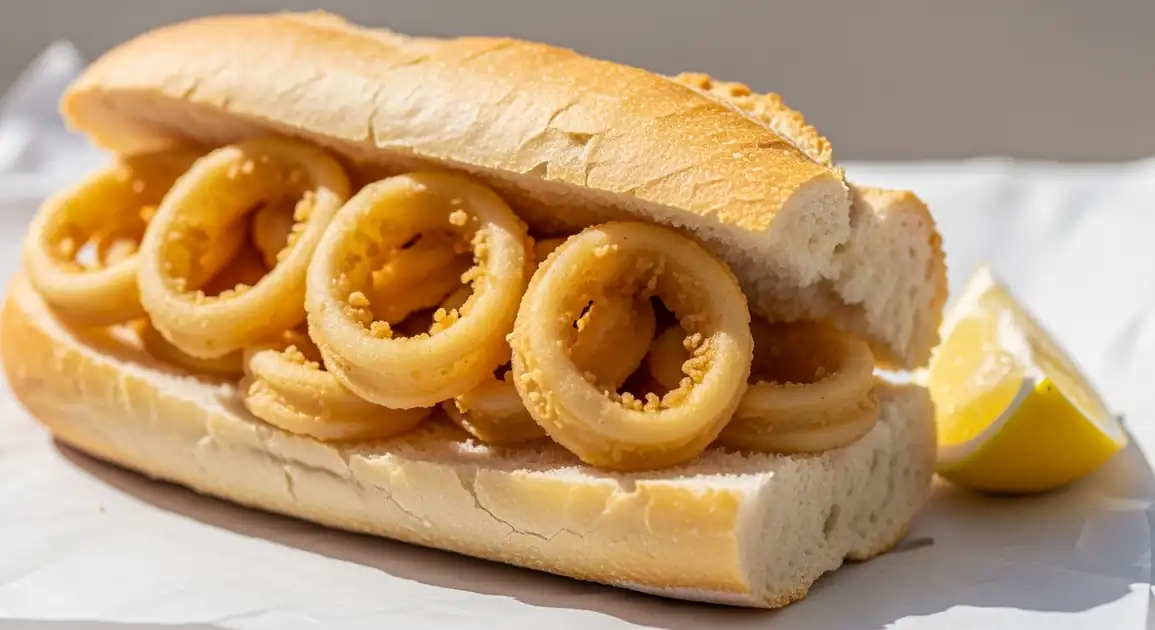Bocadillo de Calamares (Fried Squid Sandwich)
Bocadillo de Calamares

Description
Throughout Spain, Bocadillo de Calamares represents a tasty, accessible street food option found in bars, cafeterias, and market stalls. While available nationally, it's particularly associated with Madrid where it's elevated to iconic status. Coastal regions may offer even fresher squid, but Madrid's rendition remains the most famous.
Dietary Information
Serving information
Serving style
Typically served on wax paper or small plates. Often accompanied by a wedge of lemon and a napkin. Eaten by hand, sometimes cut in half for sharing as a tapa.
Quick facts
Most bars serving Bocadillo de Calamares operate from approximately 9 AM - midnight, with some famous calamari spots open late (until 2 AM or later), especially in Madrid.
Safety Tips
What to Look For
-
Calamari fried fresh to order
Fresh frying ensures food safety and optimal texture. Listen for the sizzle of squid hitting hot oil when you order.
-
Busy establishments with high turnover
Popular places cycle through ingredients quickly, meaning fresher calamari and reduced time for potential contamination.
-
Clean oil that's clear and not dark or smoking
Quality oil produces better-tasting, less greasy calamari and indicates good kitchen practices.
-
Crispy, golden-brown calamari (not pale or too dark)
Proper cooking ensures food safety while maintaining tender texture. Pale indicates undercooking, too dark suggests old oil.
-
Fresh bread with a good crust
Quality bread elevates the sandwich and indicates attention to detail throughout preparation.
What to avoid
-
Pre-fried calamari sitting under heat lamps
Squid that's been sitting out becomes tough and rubbery while potentially allowing bacteria growth.
-
Greasy, oil-soaked bread
Excessive oil indicates improper frying temperature or poor draining technique, affecting both safety and taste.
-
Fishy smell from the calamari
Fresh squid should have a neutral, oceanic smell. A strong fishy odor indicates old seafood.
-
Empty restaurants during peak meal times
Low customer volume can mean ingredients sit longer before being used.
-
Rubbery, chewy texture in the squid
Indicates overcooking or poor-quality frozen squid, suggesting general lack of attention to quality.
Price information
Price range
Budget tips
- Prices increase significantly in tourist areas like Plaza Mayor or Puerta del Sol.
- Neighborhood bars away from tourist centers offer better value (around 3.50-4.50 EUR).
- Ordering to go ('para llevar') is sometimes cheaper than eating in.
- Look for 'Menu del Día' deals that might include a small bocadillo as part of a set lunch.
Value indicators
- Generous amount of calamari visible in the sandwich.
- Freshly fried squid (not reheated).
- Served with complimentary lemon.
- Proper crusty bread, not pre-packaged varieties.
- Clean, not excessively oily presentation.
Where to Find This Dish
Urban Centers
Traditional bars and cafes in city centers across Spain serve this popular item.
Central plazas, Market areas, Shopping districts
Lunch (1 PM - 3 PM), Evening (8 PM - 10 PM)
Market Halls
Food stalls in municipal markets often specialize in various bocadillos.
Mercados municipales, Covered markets
Morning (10 AM - 1 PM), Lunch (1 PM - 3 PM)
Train/Bus Stations
Quick-service cafes in transportation hubs frequently offer this portable option.
Major train stations, Bus terminals
All day
Vendor Tips
- Look for places with 'Especialidad: Bocadillo de Calamares' signs.
- Busiest during Spanish lunch hours (1 PM - 3 PM) when most fresh.
- Establishments frequented by workers and locals usually offer better quality.
How to Order
Regional Variations
-
Classic Bocadillo de Calamares
(Bocadillo de Calamares Clásico)
The traditional version with just fried squid rings in crusty bread, served with lemon.
-
Bocadillo de Calamares with Aioli
(Bocadillo de Calamares con Alioli)
The classic sandwich served with garlic mayonnaise (alioli) either inside or on the side for dipping.
-
Bocadillo de Calamares with Bravas Sauce
(Bocadillo de Calamares con Salsa Brava)
Featuring the spicy tomato sauce typically served with patatas bravas, adding heat and tanginess.
-
Deluxe Seafood Bocadillo
(Bocadillo Mixto de Mariscos)
An upscale version that includes calamari along with other seafood like prawns or baby squid.
-
Bocadillo de Calamares on Mollete
(Bocadillo de Calamares en Mollete)
Served on a softer, rounded traditional Spanish bread roll instead of the typical baguette.
Cultural context
History
This humble sandwich emerged as a popular offering in Madrid's taverns and bars during the mid-20th century, particularly in areas near Plaza Mayor. Originally a convenient, affordable meal for workers, it evolved into an emblematic dish of Madrid's food culture. While seafood might seem surprising in landlocked Madrid, the city has historically received fresh seafood from coastal regions, with squid becoming a particularly beloved ingredient. Today, the Bocadillo de Calamares is considered one of Madrid's quintessential culinary experiences, representing the city's unpretentious approach to good food.
Local significance
Throughout Spain, and especially in Madrid, the Bocadillo de Calamares represents accessible, unpretentious Spanish cuisine. It bridges the gap between street food and bar culture.
Eating customs
- Add a squeeze of lemon just before eating.
- Typically eaten without cutlery.
- Often accompanied by a small beer or vermouth.
- Eating at the bar is common and traditional.